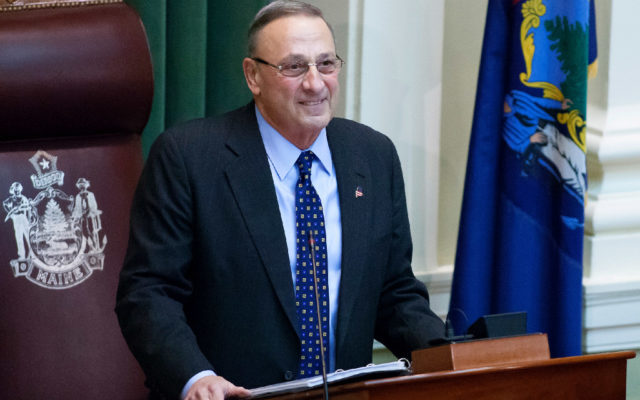
Paul LePage wants to ‘clean up’ his act. Plenty of the old LePage is still there.
By Jessica Piper, Bangor Daily News Staff
Former Gov. Paul LePage is trying to be less controversial in the early days of his campaign to oust Gov. Janet Mills, though some of his early attack lines against the incumbent have been false and his tack so far is reminiscent of his eight years in office.
The Republican has kept a low profile since officially announcing his candidacy on July 5. His campaign is planning a launch event later this fall, but becoming an official candidate sooner has allowed him to raise money. His presence at local Republican events has already provided some insight into how he might approach the campaign against Mills, a Democrat who remains relatively popular in her third year in office.
LePage hit hot-button Republican talking points at a fundraiser for a conservative political group this month, attacking critical race theory, praising voter identification laws he was not able to pass in his eight-year tenure and characterizing Democrats as socialists, according to video shared on social media. Then he teased a toned-down iteration of himself.
“I’ve been a bit controversial in the past,” the former governor said. “Hope to clean up my act this time.”
LePage reenters Maine politics in a different environment compared with 2010, when he won his first time for governor in a four-way race after riding the nascent Tea Party movement through a primary in a year in which Republicans swept into power across the country.
The former governor often made headlines during his tenure. The best-known episodes include leaving a profane voicemail message for a Democratic lawmaker, suggesting contrary to evidence that most drug dealers in Maine were people of color and vetoing more bills than all other governors combined over the past century.
Now, LePage seems more “at ease” during party events over the past few months, said Katrina Smith, chair of the Waldo County Republican Party. She praised his ability to listen to voters’ concerns, particularly as Republicans have been worried about post-pandemic economic recovery and reforming gubernatorial emergency powers.
“It does seem different,” Smith said. “He’s really conscious about making sure he tries to put Maine people in the forefront instead of his personality that might have gotten him in trouble in the past.”
The atypical circumstances of LePage’s run — a former governor with high name recognition who is popular within his own party — are conducive to a quieter campaign for now, said Jim Melcher, a political scientist at the University of Maine at Farmington.
“The people who have been attracted to him for his brusque style are going to stick with him even if he runs a more low-key campaign,” Melcher said.
LePage has favored smaller, town hall-style events before friendly crowds the early days of his campaign, not so different from his communication style during his second gubernatorial term. In a pattern consistent with his time in office, he has not stuck to facts as he attempts to go on the offensive against Mills in the early going.
At an event last weekend, LePage claimed that Maine had the highest nursing home death rate of any U.S. state. But the statement met with surprise in the room is false. Over the entire pandemic, Maine has the fourth-lowest nursing home death rate in the U.S. Roughly 5.4 percent of Maine nursing home residents have died of COVID-19. It is a large number, but the comparable national figure is 10.5 percent.
LePage strategist Brent Littlefield declined to comment, saying the campaign had a policy of not responding to media requests until after a more formal launch announcement later this year and noting that the former governor has not rolled out a policy agenda.
The former governor’s words over the past few weeks still provide some insight into the key issues of the coming campaign. LePage has touted his cuts to social services and efforts to reduce the number of state employees while criticizing Mills’ spending on Medicaid expansion, which he had refused to implement despite a 2017 referendum in favor of it.
The Democratic incumbent has begun defending her record in fundraising emails after her administration has argued LePage’s cuts hampered public health programs and the state’s labor department in the early days of the pandemic. Mills has largely avoided discussing 2022 so far, though her campaign released a statement hitting LePage when he announced his run and touted her fundraising numbers at last week’s campaign finance deadline.
If the race comes down to Mills and LePage without any third-party candidates, there may be relatively few persuadable voters for either candidate to win over, Melcher said.
“It’s a very atypical position for somebody running for governor to be in,” he said.